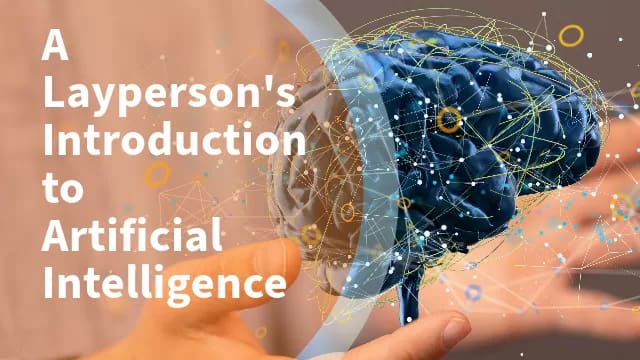Introduction
In an era defined by rapid technological advancements, the term “artificial intelligence” (AI) often dominates conversations. From self-driving cars to virtual assistants, AI is woven into the fabric of our daily lives. But what exactly is artificial intelligence, and how does it work? This article offers a layperson’s introduction to AI, shedding light on its fundamental concepts and real-world applications.
A Layperson’s Introduction to Artificial Intelligence
Artificial intelligence refers to the development of computer systems that can perform tasks that typically require human intelligence. These tasks range from recognizing patterns and making decisions to understanding natural language and even learning from experience. The goal of AI is to create machines that can mimic human cognitive functions, ultimately enhancing efficiency and enabling new capabilities.
Understanding Machine Learning
At the heart of many AI applications lies a subset called machine learning. Machine learning enables computers to improve their performance on a task through experience. Instead of being explicitly programmed, a machine learning system learns from data, identifying patterns and making predictions or decisions based on that data.
LSI Keyword: Machine Learning for Beginners
The Role of Data in Machine Learning
Data is the lifeblood of machine learning. The more diverse and comprehensive the data, the better the machine can learn and make accurate predictions. For example, in image recognition, a machine can identify objects by analyzing thousands of images containing those objects.
AI’s Impact on Everyday Life
AI has infiltrated numerous aspects of our daily routines. Virtual assistants like Siri and Alexa utilize natural language processing to understand and respond to our commands. Online shopping platforms use AI algorithms to recommend products based on our preferences and purchase history. Even social media platforms leverage AI to curate personalized content and advertisements.
LSI Keyword: AI in Everyday Applications
Autonomous Vehicles: Driving into the Future
The automotive industry is embracing AI with the development of self-driving cars. These vehicles use sensors and AI algorithms to perceive their surroundings, navigate roads, and make real-time driving decisions, promising a safer and more efficient future of transportation.
Ethical Considerations in AI
As AI continues to advance, ethical concerns emerge. Issues such as bias in algorithms, privacy violations, and the potential displacement of jobs by automation raise important questions about the responsible development and deployment of AI technologies.
LSI Keyword: Ethics in Artificial Intelligence
Addressing Algorithmic Bias
AI algorithms can inadvertently perpetuate biases present in the data they are trained on. Ensuring diversity in training data and continuous monitoring of AI systems can help mitigate bias and promote fairness.
The Future of AI: Possibilities and Challenges
The future of AI holds both incredible possibilities and challenges. AI-driven medical diagnostics could revolutionize healthcare, while AI-powered automation may transform industries and change the nature of work. However, the responsible development of AI, the protection of privacy, and the ethical implications of AI’s decisions remain critical considerations.
LSI Keyword: Future of Artificial Intelligence
Striking a Balance
As AI becomes more integrated into society, it’s essential to strike a balance between technological advancement and ethical responsibility. Transparency, accountability, and collaboration among researchers, policymakers, and industries are key to shaping AI’s future.
FAQs
Q: What is artificial intelligence, and how does it work?
A: Artificial intelligence refers to computer systems that can perform tasks requiring human intelligence, such as decision-making and pattern recognition. AI systems learn from data and experience to improve their performance.
Q: What is machine learning?
A: Machine learning is a subset of AI that enables computers to learn from data and improve their performance on tasks without being explicitly programmed.
Q: How does AI impact everyday life?
A: AI is present in virtual assistants, recommendation systems, and social media algorithms, enhancing user experiences and efficiency.
Q: What are the ethical concerns surrounding AI?
A: Ethical considerations in AI include algorithmic bias, privacy violations, and the potential displacement of jobs due to automation.
Q: What is the future of AI?
A: The future of AI holds promise in healthcare, industry automation, and more, but ethical development, privacy protection, and responsible AI deployment are crucial.
Q: How can we ensure responsible AI development?
A: Responsible AI development requires transparency, accountability, and collaboration among stakeholders to address ethical concerns and ensure positive outcomes.
Conclusion
Artificial intelligence may seem complex, but at its core, it’s about creating computer systems that can learn and perform tasks that mimic human intelligence. From enhancing our daily interactions with virtual assistants to reshaping industries through automation, AI’s impact is undeniable. As we navigate the evolving landscape of AI, it’s essential to approach its development and deployment ethically, ensuring that the potential benefits are realized while addressing the challenges responsibly.

